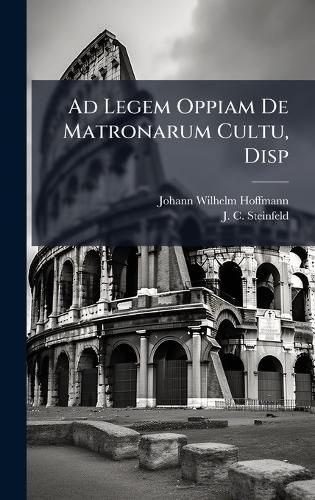Readings Newsletter
Become a Readings Member to make your shopping experience even easier.
Sign in or sign up for free!
You’re not far away from qualifying for FREE standard shipping within Australia
You’ve qualified for FREE standard shipping within Australia
The cart is loading…






This book delves into the historical significance of the 'Lex Oppia, ' a Roman law enacted in 215 BCE that restricted women's access to luxury goods and elaborate fashion. Authored by Johann Wilhelm Hoffmann and J. C. Steinfeld, the work offers a detailed analysis of the law's origins, its social and economic impact on Roman society, and the debates surrounding its eventual repeal.
Through careful examination of primary sources and historical context, the authors shed light on the motivations behind the 'Lex Oppia' and its implications for understanding gender roles and social hierarchies in ancient Rome. This book provides valuable insights into the complex interplay between law, culture, and society in the Roman Republic and its enduring relevance to discussions of sumptuary laws and gender equality.
This work has been selected by scholars as being culturally important, and is part of the knowledge base of civilization as we know it. This work was reproduced from the original artifact, and remains as true to the original work as possible. Therefore, you will see the original copyright references, library stamps (as most of these works have been housed in our most important libraries around the world), and other notations in the work.
This work is in the public domain in the United States of America, and possibly other nations. Within the United States, you may freely copy and distribute this work, as no entity (individual or corporate) has a copyright on the body of the work.
As a reproduction of a historical artifact, this work may contain missing or blurred pages, poor pictures, errant marks, etc. Scholars believe, and we concur, that this work is important enough to be preserved, reproduced, and made generally available to the public. We appreciate your support of the preservation process, and thank you for being an important part of keeping this knowledge alive and relevant.
$9.00 standard shipping within Australia
FREE standard shipping within Australia for orders over $100.00
Express & International shipping calculated at checkout
Stock availability can be subject to change without notice. We recommend calling the shop or contacting our online team to check availability of low stock items. Please see our Shopping Online page for more details.
This book delves into the historical significance of the 'Lex Oppia, ' a Roman law enacted in 215 BCE that restricted women's access to luxury goods and elaborate fashion. Authored by Johann Wilhelm Hoffmann and J. C. Steinfeld, the work offers a detailed analysis of the law's origins, its social and economic impact on Roman society, and the debates surrounding its eventual repeal.
Through careful examination of primary sources and historical context, the authors shed light on the motivations behind the 'Lex Oppia' and its implications for understanding gender roles and social hierarchies in ancient Rome. This book provides valuable insights into the complex interplay between law, culture, and society in the Roman Republic and its enduring relevance to discussions of sumptuary laws and gender equality.
This work has been selected by scholars as being culturally important, and is part of the knowledge base of civilization as we know it. This work was reproduced from the original artifact, and remains as true to the original work as possible. Therefore, you will see the original copyright references, library stamps (as most of these works have been housed in our most important libraries around the world), and other notations in the work.
This work is in the public domain in the United States of America, and possibly other nations. Within the United States, you may freely copy and distribute this work, as no entity (individual or corporate) has a copyright on the body of the work.
As a reproduction of a historical artifact, this work may contain missing or blurred pages, poor pictures, errant marks, etc. Scholars believe, and we concur, that this work is important enough to be preserved, reproduced, and made generally available to the public. We appreciate your support of the preservation process, and thank you for being an important part of keeping this knowledge alive and relevant.